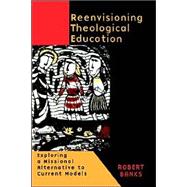In the first section of the book Robert Banks provides the most exhaustive and up-to-date survey of the positions advanced in the educational debate during the last fifteen years and offers an analysis of the debate as a whole, including insightful critiques of some of the traditional assumptions of theological education.
The second section explores how ministry formation took place in biblical times. This investigation lays the groundwork for a more satisfactory -- and largely unexplored -- approach to education that Banks calls the "missional model". The third section of the book fleshes out this missional model through a reconsideration of the key concerns and issues in the educational debate, and shows why this new model of theological education is more holistic, inclusive, and practical than current versions.
The final section of the book suggests









